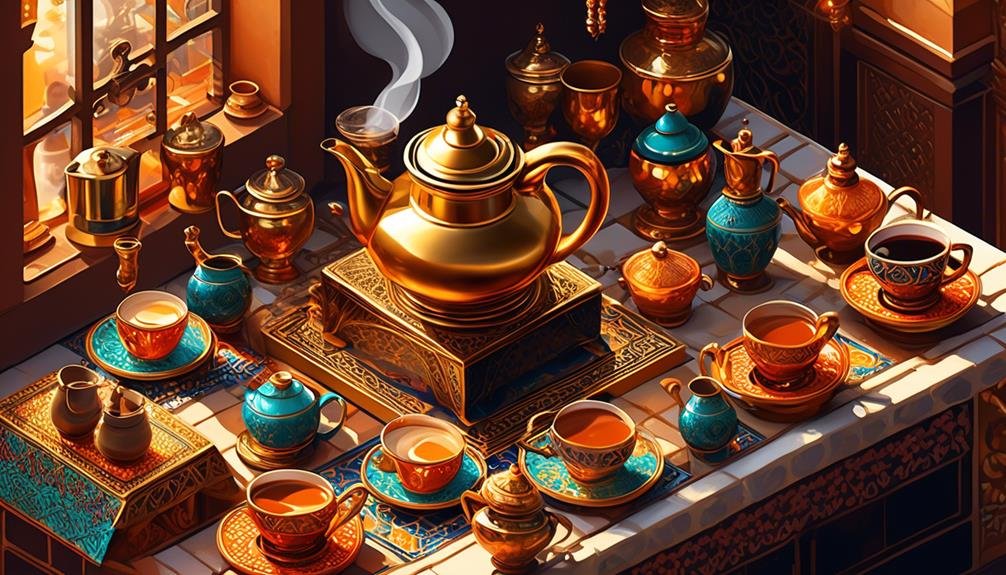If you think your morning cup of coffee is just a simple routine, think again. Coffee rituals around the world are far from ordinary, each country bringing its own unique flair to the beloved beverage.
From Italy's obsession with espresso to Turkey's elaborate Turkish coffee ritual, there's a world of coffee customs waiting to be explored.
So, grab your mug and prepare to embark on a journey that will leave you craving more…
Key Takeaways
- Italy's espresso culture emphasizes precision and speed, with Italians savoring the strong taste and invigorating effect of espresso consumed in minutes.
- Ethiopia's coffee ceremony is a social and cultural experience that symbolizes hospitality, friendship, and community, with coffee beans carefully roasted, ground by hand, and brewed in a traditional pot.
- Japan's siphon brewing tradition combines science, precision, and artistry, creating a smooth and clean cup of coffee that engages all the senses through its mesmerizing brewing process.
- The Turkish coffee ritual is a sensory delight, with the coffee prepared in a small copper pot and served in small cups, offering a rich aroma, velvety texture, and intense, complex taste, often accompanied by the practice of fortune-telling through reading the coffee grounds.
Italy's Espresso Culture
Italy's espresso culture is a vibrant and integral part of daily life, where locals and visitors alike indulge in the rich and aromatic tradition of sipping on a perfectly brewed shot of espresso. Italians take their coffee seriously, and the process of making and consuming espresso is considered an art form.
In Italy, coffee isn't just a beverage; it's a way of life. The espresso experience begins at the bar, where you'll find a bustling atmosphere filled with people standing shoulder to shoulder, chatting animatedly over their cups of steaming espresso. The baristas, known as 'maestros,' skillfully operate the espresso machines, creating the perfect shot of espresso with precision and speed.
The espresso itself is a concentrated form of coffee, made by forcing hot water through finely ground coffee beans at high pressure. The result is a small, intense shot of coffee that's full-bodied and rich in flavor. Italians typically consume their espresso in a matter of minutes, savoring the strong taste and the invigorating effect it provides.
In Italy, coffee is enjoyed throughout the day, but never after a meal. It's believed that the bitter taste of espresso helps aid digestion, making it the perfect ending to a meal. Whether you're a coffee connoisseur or simply looking to immerse yourself in Italian culture, exploring Italy's espresso culture is an experience not to be missed.
Ethiopia's Coffee Ceremony
As we move from the vibrant espresso culture of Italy, let's now journey to Ethiopia, where the coffee ceremony holds a significant place in the hearts and traditions of its people.
In Ethiopia, the coffee ceremony isn't just about the beverage itself, but also about the social and cultural experience that surrounds it.
The coffee ceremony typically takes place in the home, and it's a time for family and friends to come together and bond over a shared love for coffee. The hostess of the ceremony, known as the 'Ebun', carefully roasts the coffee beans over an open flame, filling the room with the rich aroma of freshly roasted coffee. The beans are then ground by hand using a mortar and pestle, ensuring that every cup is made with care and precision.
Once the coffee is brewed, it's served in small cups called 'cini'. The hostess pours the coffee from a traditional coffee pot called a 'jebena', holding it high above the cups to create a beautiful, cascading pour. The coffee is served with sugar and sometimes accompanied by snacks such as popcorn or peanuts.
The coffee ceremony in Ethiopia is more than just a way to enjoy a cup of coffee; it's a symbol of hospitality, friendship, and community. It's a time to slow down, connect with loved ones, and appreciate the simple pleasures of life.
Japan's Siphon Brewing Tradition
Japan's Siphon Brewing Tradition takes coffee brewing to a whole new level, combining science, precision, and artistry to create a truly unique and captivating experience. The siphon brewing method, also known as vacuum coffee brewing, originated in the early 19th century and has since become a beloved tradition in Japan.
The process begins with a beautiful glass siphon pot consisting of two chambers, one on top of the other, connected by a tube. The lower chamber is filled with water, while the upper chamber holds the coffee grounds. As heat is applied to the lower chamber, the water begins to rise, creating a vacuum that forces the water into the upper chamber, where it mixes with the coffee grounds. This infusion allows the flavors to fully develop, resulting in a clean and smooth cup of coffee.
What sets the Japanese siphon brewing apart is the attention to detail and the emphasis on aesthetics. The delicate balance between heat, water, and coffee grounds requires precise measurements and timing. The barista meticulously controls the temperature and brewing time to ensure optimal extraction. Moreover, the mesmerizing process of watching the water rise and fall in the glass chamber adds a touch of theater to the experience.
Siphon brewing in Japan isn't just about the end result; it's a sensory journey that engages all your senses. The aroma of freshly brewed coffee fills the air, inviting you to savor each sip. The sight of the swirling water and the transparency of the pot showcase the brewing process, leaving you in awe of the intricate mechanics at play. The smooth, clean taste of the coffee leaves a lasting impression, making siphon brewing a truly unforgettable experience.
Turkey's Turkish Coffee Ritual
Immerse yourself in the rich cultural heritage of Turkey as you discover the captivating Turkish Coffee Ritual. Step into a traditional Turkish coffeehouse, and you'll be transported to a world where time seems to stand still. This ritual, dating back to the 16th century, isn't just about enjoying a cup of coffee; it's a social and cultural experience that brings people together.
The Turkish Coffee Ritual begins with the preparation of the coffee. Finely ground coffee beans are mixed with water and sugar, then slowly heated in a small copper pot called a cezve. As the mixture comes to a boil, it creates a frothy layer known as kaimaki, which is carefully poured into small cups.
Sipping Turkish coffee is a sensory delight. The rich aroma fills the air, while the velvety texture of the coffee coats your palate. The taste is intense and complex, with notes of chocolate, spices, and a hint of bitterness. As you savor each sip, take a moment to read the coffee grounds left at the bottom of your cup. It's believed that these patterns can reveal your fortune or foretell your future.
But the Turkish Coffee Ritual is about more than just the coffee itself. It's a time for conversation, connection, and contemplation. It's a moment to slow down, enjoy the company of loved ones, and appreciate the simple pleasures of life.
Sweden's Fika Tradition
In Sweden, prepare to indulge in the delightful tradition known as Fika, where coffee breaks become a cherished part of daily life. Fika isn't just about having a cup of coffee; it's a cultural ritual that allows Swedes to take a moment to relax and connect with others. Fika is typically enjoyed with a variety of sweet treats, such as cinnamon buns or cookies.
Fika is taken seriously in Sweden, with some workplaces even having designated Fika breaks. It's a time to socialize, catch up with friends or colleagues, and enjoy a moment of calm amidst the hustle and bustle of daily life. The atmosphere during Fika is relaxed and cozy, with many cafes and homes offering a warm and inviting environment.
During Fika, it's common to engage in meaningful conversations, discussing everything from current events to personal stories. It's a time to slow down, savor the flavors of the coffee and treats, and truly enjoy the company of others. Fika isn't hurried; it's about taking the time to fully immerse yourself in the moment and appreciate the simple pleasures of life.
Frequently Asked Questions
What Is the History and Origin of Espresso in Italy's Coffee Culture?
Espresso in Italy's coffee culture has a rich history and origin. It emerged in the early 20th century as a quick and concentrated way to enjoy coffee, becoming an integral part of Italian daily life.
What Are the Traditional Rituals and Customs Involved in Ethiopia's Coffee Ceremony?
In Ethiopia, the coffee ceremony is a cherished tradition. You'll witness the roasting of beans, the aromatic scent filling the air. Then, the coffee is brewed and served in small cups, symbolizing friendship and community. It's a truly immersive and meaningful experience.
How Is the Siphon Brewing Tradition Practiced in Japan and What Makes It Unique?
In Japan, the siphon brewing tradition is a unique coffee ritual. It involves using a specialized brewing device to create a vacuum effect, resulting in a smooth and flavorful cup of coffee.
What Is the Significance of the Turkish Coffee Ritual in Turkey's Culture and How Is It Prepared?
The Turkish coffee ritual holds great significance in Turkey's culture. It is prepared by boiling finely ground coffee beans in a cezve, a special pot. The coffee is then poured into small cups, allowing the grounds to settle, and enjoyed slowly.
What Are the Key Elements of the Fika Tradition in Sweden and How Is It Observed in Daily Life?
In Sweden, the fika tradition is a cherished part of daily life. It involves taking a break, enjoying a cup of coffee, and indulging in pastries or treats with friends or colleagues.
Conclusion
In conclusion, coffee rituals vary greatly from country to country, each offering a unique and fascinating experience.
From Italy's rich and flavorful espresso culture to Ethiopia's elaborate coffee ceremony, Japan's meticulous siphon brewing tradition, Turkey's aromatic Turkish coffee ritual, and Sweden's cozy fika tradition, coffee lovers around the world are treated to an array of customs and flavors.
These rituals not only enhance the coffee-drinking experience but also provide a glimpse into the rich cultural heritage and traditions of each country.
So, next time you sip on your favorite brew, remember that coffee is more than just a beverage—it's an invitation to explore and appreciate different cultures.




